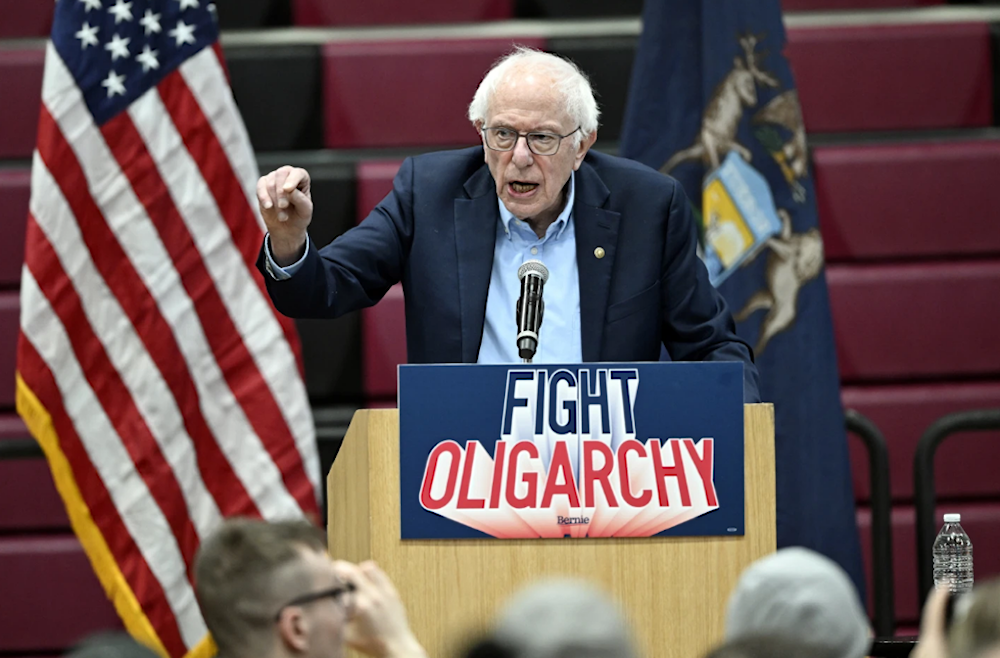Senator Bernie Sanders calls for end to 'oligarchy' in US elections
Bernie Sanders calls out the growing influence of billionaires in US politics, blaming the 2010 Citizens United court decision for enabling a 16,000% rise in election spending by the wealthy.
-
 Sen. Bernie Sanders speaks during a “Fighting Oligarchy: Where We Go From Here” event in March in Michigan. (AP)
Sen. Bernie Sanders speaks during a “Fighting Oligarchy: Where We Go From Here” event in March in Michigan. (AP)
In a post on X, US Senator Bernie Sanders referred to the overwhelming influence of billionaires in US elections as "what oligarchy looks like," emphasizing the significant role the 2010 Citizens United v. Federal Election Commission Supreme Court decision played in transforming the political landscape.
Sanders pointed to the staggering 16,000% increase in election spending by billionaires since the controversial ruling. His comments bring to light concerns over the increasing role money plays in shaping electoral outcomes.
In his post, Sanders calls to overturn "Citizens United", a landmark 2010 ruling by the US Supreme Court that had profound implications for campaign finance, wherein the Court ruled that the First Amendment protected the right of corporations, unions, and other organizations to spend unlimited amounts of money on political campaigns.
This is what oligarchy looks like.
— Bernie Sanders (@BernieSanders) April 8, 2025
Since the disastrous Citizens United Supreme Court decision, spending by billionaires in elections has grown more than 16,000%.
End billionaire control of our democracy. Overturn Citizens United. pic.twitter.com/jzKOpNhfgb
Sanders' X post shows that election spending in 2024 was more than double that of 2020, increasing exponentially since the 2010 ruling.
According to The Associated Press (AP) Sanders' team intentionally waited in the early weeks of the Trump presidency to launch what they are now calling his “stop oligarchy tour” to see if a high-profile Democrat would fill the leadership void.
Last month, Sanders said, “What all of this tells me, is not just in Michigan or in Vermont, the people of this country will not allow us to move toward oligarchy. They will not allow Trump to take us into authoritarianism,” Sanders yelled. “We’re prepared to fight. And we’re going to win.”
“This is like presidential campaign rallies, isn’t it? But I’m not running for president, and this is not a campaign,” Sanders said. “You gotta do what you gotta do. The country’s in trouble and I want to play my role.”
The Democratic Party’s left wing has warned for decades that America is moving toward an oligarchy in which a handful of billionaires control much of the nation’s wealth and political power. Former President Joe Bidon made a similar warning last month in his last address to the nation.
An oligarchy is an elite few who control the government’s actions.
The increasing involvement of billionaires in politics has raised concerns about the concentration of power in the hands of a few wealthy individuals and the potential for this wealth to drown out the voices of ordinary citizens.
Election spending
In the last US presidential election, the world’s wealthiest billionaires feted US President Donald Trump. Federal Election Commission filings have declared Elon Musk the largest political donor of the 2024 elections.
Forbes recorded a breakdown of 83 billionaires supporting Harris and 52 backing Trump just one month before the November elections last year, and according to AP, Meta CEO Mark Zuckerberg cohosted a Trump inaugural reception with wealthy Republican donors, and Amazon Prime Video, which was founded by billionaire Jeff Bezos, got exclusive licensing rights to stream and theatrically release first lady Melania Trump‘s new documentary.
Meta, Amazon, and OpenAI CEO Sam Altman donated $1 million to Trump’s inauguration fund in December of last year, and billionaire Elon Musk’s super PAC spent over $200 million to help elect Trump.
The Citizens United ruling had allowed for the creation of so-called "super PACs". According to the Federal Election Commission, Super PACs (independent expenditure only political committees) are committees that may receive unlimited contributions from individuals, corporations, labor unions and other PACs for the purpose of financing independent expenditures and other independent political activity.
Powerful lobby groups also influence elections. According to an investigation from the Intercept last October,the American Israel Public Affairs Committee (AIPAC), the most powerful pro-"Israel" lobby group, announced plans to spend an astonishing $100 million to shape the congressional landscape, making it one of the most influential spenders in US elections.

 4 Min Read
4 Min Read










